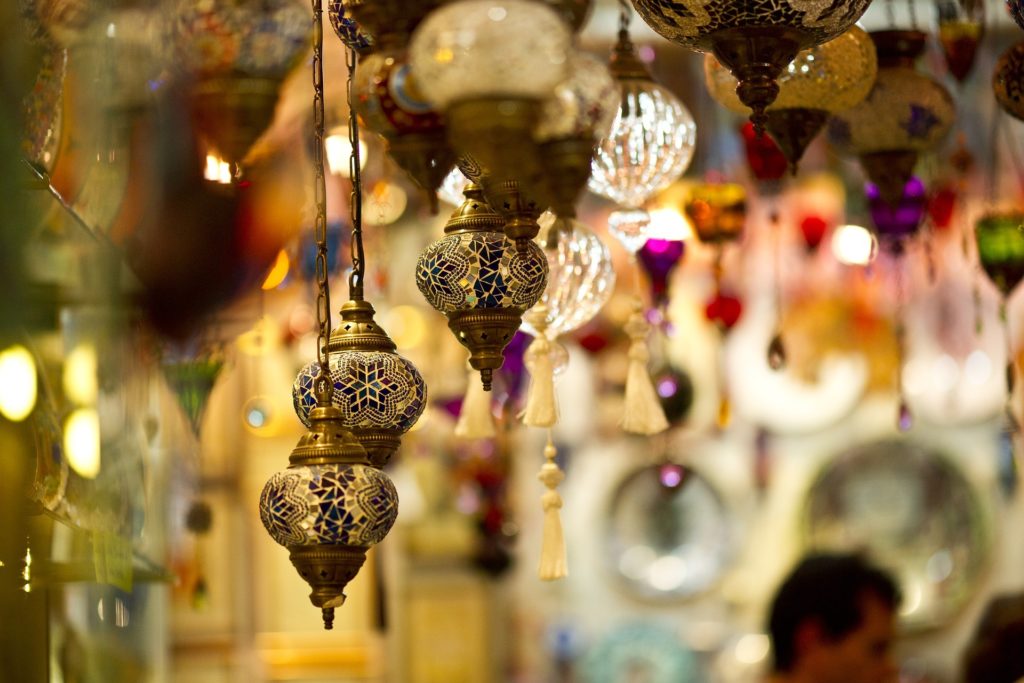The Earth held no prophet. Its people were lost in an utter darkness – no prophet, no current message, no light for souls seeking solace. The last prophet had lived and left the Earth hundreds of years ago. There was an utter deprivation of righteousness. There was a hunger and a yearning for the return of the Divine will – for the presence of one who would reflect that light. A Jew ran through the streets of Mecca asking, “Was anyone born to you on this night?” None were sure and he cried out to them, “Find out, for on this night a prophet was born.”
The midwife saw the stars come so near that she felt they would touch her, and at his (s) birth she could see nothing but light.
His mother saw a light emanating from her that lit the palaces of Sham – such that she could see them.
This child was the answer to Ibrahim’s prayer, and the good news of `Isa.
The child was an end to the pause. The period of darkness, the prophet-less age, had come to an end. The final prophet was here. Never again would there be a pause in the divine will, or light – for Muhammad صلى الله عليه و سلم was sent to all people; to all nations; to all generations till the end of time.
It happened on a Monday, the 12th of Rabi` al Awwal, in the Year of the Elephant. The Prophet صلى الله عليه و سلم was born. Al hamdulillah! Our prophet! Born! What a day! A day for celebrations, thanksgiving! A day for happiness and smiles! It was a day for congratulatory handshakes, and joyful kisses on the cheek; a day to be remembered.
The month of the Prophet’s birth is a month of great joy for Muslims everywhere. For centuries, different cultures and peoples have recited poetry, gathered together and increased their good deeds in celebration and remembrance of his birth.
The Mawlid celebration, yes or no?
There is among Muslims today a question mark that hangs above the invitation to a Mawlid celebration. Is it acceptable? Is it not a ‘bida`’ (innovation)? It is interesting how Muslims return to the same questions asked before – as though living in waves wherein the new wave of people does not remember what the earlier people said and did.
Numerous early scholars responded to the question, “Mawlid?”:
Imam Sakhawi says, “In every land, and every city the Islamic people continue to celebrate his صلى الله عليه و سلم birth by holding fine gatherings involving all manner of dignified celebration, and making many charitable donations by night, and expressing their joy, and increasing their righteous acts, and reading the story of his glorious birth; and the all-embracing grace of this blessed time is manifest in them.”
Al Suyuti quotes Ibn Hajar as giving the example of the day of `Ashura – that Prophet Muhammad صلى الله عليه و سلم called upon Muslims to fast this day in celebration of this day of the victory of Moses over Pharoah; saying that thus it is valid to celebrate days of blessing. Al Suyuti then comments, “What blessing is greater than the birth of the Prophet, the Prophet of Mercy, on this day?”
Imam Ibn al Jawzi says about the celebrated Mawlid, “It is security throughout the year, and glad tidings that all wishes and desires will be fulfilled.”
Prophet ‘Isa (a) is quoted saying about himself in the Quran, {Peace is on me the day I was born, the day that I die and the day that I shall be raised up to life (again)!} (Maryam: 33) and about Prophet Yayha, Allah (swt) says, {So Peace on him the day he was born, the day that he dies, and the day that he will be raised up to life (again)!} (Maryam: 15) In this month of the Prophet’s birth, then, is celebration: Celebration of the blessing of a living-breathing example of how Allah (swt) wants us to live; celebration of the birth of the final Prophet; celebration of the greatest blessing the earth was ever to receive. May peace and blessings be upon him.
How to celebrate:
1. Hold a Mawlid: Invite people to your home, serve something delicious, ask someone to recite a poem about the Prophet’s birth (a famous one in Arabic, or Urdu, or Malay – or write your own.) Sing some songs about him صلى الله عليه و سلم. Talk about Islam and encourage each other to follow in his صلى الله عليه و سلمway.
2. Give a gift: Think about what you might give the Prophet صلى الله عليه و سلم as a gift. You might decide to read the Sirah this month, or choose a sunnah to add to your schedule. Perhaps you will give money to one without, or bring happiness to a sad heart, or knowledge to a confused follower. Think of that which would make him (s) happy, that which he would be proud to see on Fridays when he looks at his صلى الله عليه و سلم ummah, that which you would be pleased to show on the Day of Judgment
Share your gift giving ideas. Increase in salawat: Allah says, “Verily Allah and His angels send prayers upon the Prophet; O you who believe, send prayers upon him and greet him with the greeting of peace.” (al Ahzab: 56) and the Prophet (s) said, “Make not your homes graves, and make not my grave a celebration. Send prayers upon me, for your prayers reach me wherever you are.” (Abu Huraira – Sunan Abu Dawood). Saying “Allahumma salli `ala sayyidina Muhammad,” many times this month – is another way to celebrate his (s) birth.

